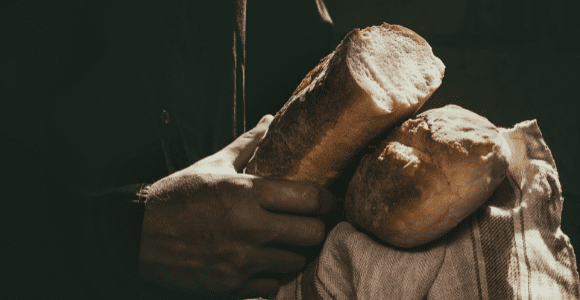Welcome readers! Please subscribe through the buttons on the right.

Our reading this week comes from the gospel of John,
Then Jesus declared, “I am the bread of life. Whoever comes to me will never go hungry, and whoever believes in me will never be thirsty . . . At this the Jews there began to grumble about him because he said, “I am the bread that came down from heaven.” They said, “Is this not Jesus, the son of Joseph, whose father and mother we know? How can he now say, ‘I came down from heaven’?” “Stop grumbling among yourselves,” Jesus answered. “No one can come to me unless the Father who sent me draws them, and I will raise them up at the last day. It is written in the Prophets: ‘They will all be taught by God.’ Everyone who has heard the Father and learned from him comes to me. No one has seen the Father except the one who is from God; only he has seen the Father. Very truly I tell you, the one who believes has eternal life. I am the bread of life. Your ancestors ate the manna in the wilderness, yet they died. But here is the bread that comes down from heaven, which anyone may eat and not die. I am the living bread that came down from heaven. Whoever eats this bread will live forever. This bread is my flesh, which I will give for the life of the world.” (John 6:35, 41-51)
Our passage this week starts a chain of “I am” statements that are unique to the gospel of John. There are six more in this version of the Jesus story, seven in total. In John 8:12, Jesus states, “I am the light of the world.” In John 8:58, he says, “I existed before there was an Abraham.” In John 10:11, he says, “I am the good shepherd,” and in John 11:25, he says “I am the resurrection and the life.” In John 14:6, he says, “I am the way, and I am the truth, and I am life,” and lastly, in John 15:1, he says, “I am the authentic vine.”
Robert Funk explains that John’s Greco-Roman audience would have recognized this series as an “established formula in speech attributed to one of the gods” (p. 419, The Five Gospels). For John’s Jewish audience, these sayings could have echoed Yahweh’s words to Moses: “ I am who I am” (Exodus 3:14). Both associations would have highly honored the Jewish Jesus by whom many who encountered him had their lives changed forever.
But also note two things. John’s language about “the Jews” has proven deeply harmful to our Jewish siblings. We must be careful in how we read, understand, and use this passage, and we must not use it to harm Jewish people.
Another problematic phrase is, “No one has seen the Father except the one who is from God; only he has seen the Father.” This seems to contradict the synoptic Jesus who accused those in control of the status quo of having established a monopoly on knowing God: “Damn you experts in the law, because you have taken away the key to knowledge. You yourselves have not entered, and you have blocked those who were entering.” (Luke 11:52) There is much to ponder here.
Can we reclaim this passage in our lectionary reading for this week?
We’ll begin unpacking this passage in Part 2.













